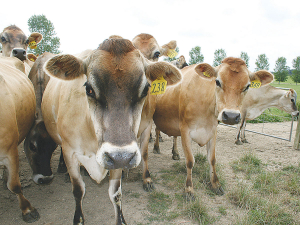We must keep our foot on the pedal
OPINION: Last week marked a major step forward in our work to eradicate Mycoplasma bovis.
 Ministry for Primary Industries (MPI) is investigating how a new strain of M. bovis infected a herd in Canterbury.
Ministry for Primary Industries (MPI) is investigating how a new strain of M. bovis infected a herd in Canterbury.
Another case of Mycoplasma bovis has been discovered in Canterbury, bringing the total number of active cases to five.
The Ministry for Primary Industries (MPI) says the latest case does not appear to be the new strain 29 which is currently under investigation.
Meanwhile the director of MPI's M bovis programme Simon Andrew has confirmed that the herd of cows in Canterbury where a new strain was discovered will have to be slaughtered.
He says his organisation is working with the farmer to determine a convenient time for the herd to go and says the farmer and his family are being very cooperative at this difficult time.
Andrew says there is good pastoral support programme available to farmers, their family and community that are caught up in an outbreak of M. bovis.
"We have good relationships with our partners such as DairyNZ and B+LNZ and we have got an independent group that supports farmers when in putting compensation claims through as well.
"Then we have got the Rural Support Trust in there as well providing support," he told Dairy News.
Andrew says MPI is continuing its investigation into how the new strain, known as strain 29, got into the herd.
He says they are looking at a number of pathways it might have taken into NZ and onto the property, including farm machinery, frozen semen and embryos. He says they want to get a clear understanding of what has happened and will continue their extensive testing programme.
He says, in addition to the testing on the affected farm, they have a rigorous ongoing testing programme that they do nationally and have confidence that with this and the traceability work, they will be able to identify any new risks.
Andrew says every single commercial dairy farm in the country is tested fortnightly via the bulk tank milk surveillance programme and other targeted testing.
"There is no evidence of this strain being found anywhere else, but it is important that we continue to do the testing.
“There is no evidence of this strain being found anywhere else, but it is important that we continue to do the testing. We are in a very different place to where we were when M. bovis first came into the country. We have a significant testing programme, technical and operational capability and experience in dealing with it,” he says.
 |
|---|
|
Simon Andrew |
Andrew says a number of actions have been taken in recent times to mitigate the risk of the disease going unchecked. He says new import health standards have been introduced to deal with frozen semen and that will reduce risk.
“We will just continue to do the investigation and we have to be openminded that it might be difficult to identify a categorical link to the new strain.
“But it’s important to note that all the respective pathways are incredibly low risk,” he says.
He says they will continue to seek advice from technical experts in NZ and overseas, but points out than many overseas countries are very interested in the work that MPI is doing here.
Coming in at a year-end total at 3088 units, a rise of around 10% over the 2806 total for 2024, the signs are that the New Zealand farm machinery industry is turning the corner after a difficult couple of years.
New Zealand's animal health industry has a new tool addressing a long-standing sustainability issue.
The Government has announced that ACC will be a sponsor of this year's FMG Young Farmer of the Year competition.
As veterinary student numbers grow to help address New Zealand's national workforce shortge, Massey University's School of Veterinary Science is inviting more veterinary practices to partner in training the next generation of vets.
South Island dairy farmers will soon be able to supply organic milk to Fonterra.
Norwood has announced the opening of a new Tasman dealership at Richmond near Nelson next month.
OPINION: There will be no cows at Europe's largest agricultural show in Paris this year for the first time ever…
OPINION: Canterbury grows most of the country's wheat, barley and oat crops. But persistently low wheat prices, coupled with a…